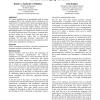Free Online Productivity Tools
i2Speak
i2Symbol
i2OCR
iTex2Img
iWeb2Print
iWeb2Shot
i2Type
iPdf2Split
iPdf2Merge
i2Bopomofo
i2Arabic
i2Style
i2Image
i2PDF
iLatex2Rtf
Sci2ools
140
click to vote
CSCW
2000
ACM
2000
ACM
Interaction and outeraction: instant messaging in action
We discuss findings from an ethnographic study of instant messaging (IM) in the workplace and its implications for media theory. We describe how instant messaging supports a variety of informal communication tasks. We document the affordances of IM that support flexible, expressive communication. We describe some unexpected uses of IM that highlight aspects of communication which are not part of current media theorizing. They pertain to communicative processes people use to connect with each other and to manage communication, rather than to information exchange. We call these processes “outeraction.” We discuss how outeractional aspects of communication affect media choice and patterns of media use. Keywords Instant messaging, media theory, informal communication, computer-mediated communication, outeraction.
CSCW 2000 | Informal Communication | Informal Communication Tasks | Instant Messaging | Social Sciences |
| Added | 01 Aug 2010 |
| Updated | 01 Aug 2010 |
| Type | Conference |
| Year | 2000 |
| Where | CSCW |
| Authors | Bonnie A. Nardi, Steve Whittaker, Erin Bradner |
Comments (0)

